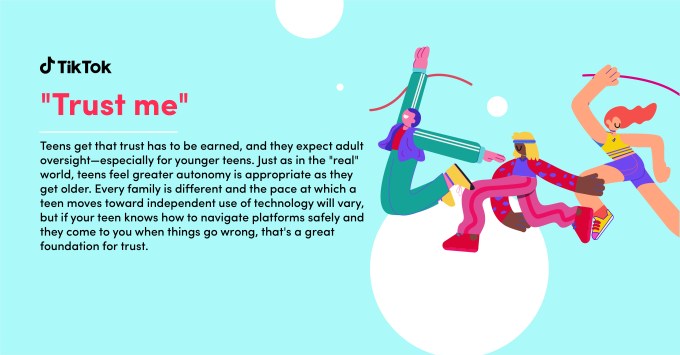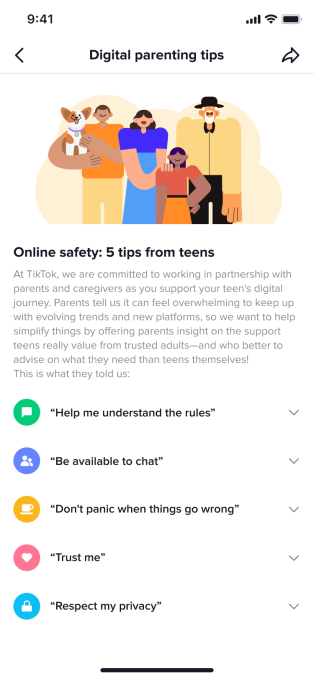TikTok is expanding its in-app parental controls feature, Family Pairing, with educational resources designed to help parents better support their teenage users, the company announced morning. The pairing feature, which launched to global users last year, allows parents of teens aged 13 and older to connect their accounts with the child’s so the parent can set controls related to screen time use, who the teen can direct message, and more. But the company heard from teens that they also want their voices to be heard when it comes to parents’ involvement in their digital life.
To create the new educational content, TikTok partnered with the online safety nonprofit, Internet Matters. The organization developed a set of resources in collaboration with teens that aim to offer parents tips about navigating the TikTok landscape and teenage social media usage in general.
Teens said they want parents to understand the rules they’re setting when they use features like Family Pairing and they want them to be open to having discussions about the time teens spend online. And while teens don’t mind when parents set boundaries, they also want to feel they’ve earned some level of trust from the adults in their life.
The older teens get, the more autonomy they want to have on their own device and social networks, as well. They may even tell mom or dad that they don’t want them to follow them on a given platform.
This doesn’t necessarily mean the teen is up to no good, the new resources explain to parents. The teens just want to feel like they can hang out with their friends online without being so closely monitored. This has become an important part of the online experience today, in the pandemic era, where many younger people are spending more time at home instead of socializing with friends in real-life or participating in other in-person group activities.

Image Credits: TikTok
Teens said they also want to be able to come to parents when something goes wrong, without fearing that they’ll be harshly punished or that the parent will panic about the situation. The teens know they’ll be consequences if they break the rules, but they want parents to work through other tough situations with them and devise solutions together, not just react in anger.
All this sounds like straightforward, common sense advice, but parents on TikTok often have varying degrees of comfort with their teens’ digital life and use of social networks. Some basic guidelines that explain what teens want and feel makes sense to include. That said, the parents who are technically savvy enough to enable a parental control feature like Family Pairing may already be clued into best practices.

Image Credits: TikTok
In addition, this sort of teen-focused privacy and safety content is also designed to help TikTok better establish itself as a platform working to protect its younger users — an increasingly necessary stance in light of the potential regulation which big tech has been trying to ahead of, as of late. TikTok, for instance, announced in August it would roll out more privacy protections for younger teens aimed to make the app safer. Facebook, Google and YouTube also did the same.
TikTok says parents or guardians who have currently linked their account to a teen’s account via the Family Pairing feature will receive a notification that prompts them to find out more about the teens’ suggestions and how to approach those conversations about digital literacy and online safety. Parents who sign up and enable Family Pairing for the first time, will also be guided to the resources.

